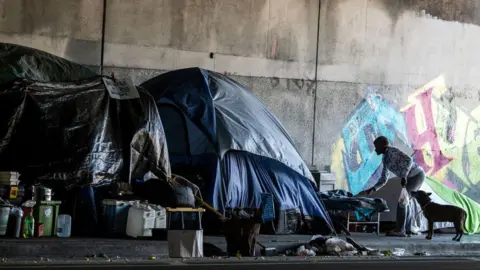US Supreme Court allows cities to ban homeless camps
 Getty Images
Getty ImagesThe US Supreme Court has ruled in a 6-3 vote along ideological lines that cities can ban homeless people from sleeping rough.
It is the court's most significant decision on homelessness since at least the 1980s, when many experts say the modern US homeless crisis began.
The ruling says that local governments can enforce laws against people sleeping in public places without being in violation of the US constitution's limits on cruel and unusual punishment.
The case started in the small city of Grants Pass, Oregon, where three homeless people sued after receiving citations for sleeping and camping outside.
At a Supreme Court hearing in April, the city argued that criminal penalties were necessary to enforce local laws banning homeless people from public spaces for "reasons of cleanliness and safety".
The homeless residents said those penalties violated the Eighth Amendment of the US Constitution because the city did not have any public shelters.
Writing for the conservative majority in an opinion issued on Friday, Justice Neil Gorsuch wrote that the city's regulations on camping do not inflict “terror, pain or disgrace”.
He added that the law does not criminalise the “mere status” of being homeless, and that the ban focuses more on the actions taken by individuals rather than their status alone.
“Under the city’s laws, it makes no difference whether the charged defendant is homeless, a backpacker on vacation passing through town, or a student who abandons his dorm room to camp out in protest on the lawn of a municipal building,” Justice Gorsuch wrote.
Justice Sonia Sotomayor, writing on behalf of the three dissenting liberal justices, wrote: “Sleep is a biological necessity, not a crime. Homelessness is a reality for so many Americans.”
Several cities issued statements welcoming the ruling. San Francisco said it would help cities "manage our public spaces more effectively and efficiently," and the city of Grants Pass, the centre of the legal dispute, said that city leaders would meet with their lawyers to discuss next steps.
Homelessness is on the rise in the US, fuelled in part by chronic shortages of affordable housing. Around 653,000 people did not have homes in 2023, the largest number since tracking began in 2007, according to US government figures.
There were also an estimated 256,000 people living without shelter on a given night across the country last year, according to the Department of Housing and Urban Development.
Reacting to the ruling, the National Alliance to End Homelessness said it "sets a dangerous precedent that will cause undue harm to people experiencing homelessness and give free reign to local officials who prefer pointless and expensive arrests and imprisonment, rather than real solutions".
Grants Pass's population has doubled to 40,000 in the last 20 years, but its supply of affordable or public housing has not.
Soaring housing costs led to a sizeable number of people losing their homes.
Town officials responded by passing laws that fined people for sleeping or camping in public. Over time, those fines stacked up, reaching thousands of dollars for some.
Unable to pay for multiple citations, three homeless people sued the city.
Their lawsuit reached the 9th Circuit Court of Appeals, which decided in 2022 that the restrictions in Grants Pass were so tight that they amounted to an effective ban on being homeless within city limits.
The court had determined four years earlier in a similar case in Idaho that the constitution “bars a city from prosecuting people criminally for sleeping outside on public property when those people have no home or other shelter to go to".
Meanwhile, the homeless crisis has continued to worsen.
Jennifer Friedenbach, of the Coalition on Homelessness in San Francisco, said that money and resources should "go towards getting folks off the streets".
“What we know is that arresting and fining people for being homeless doesn't work," she said. "It doesn't get anybody off the streets. It wastes municipal resources, and it exacerbates homelessness."
The Supreme Court's Grants Pass decision will now allow cities to take more severe measures without the fear of legal recourse.
The first problem with putting homeless people in jail is that it is extremely expensive, and when they get out, the person is still homeless and now even less apt to finding employment with a criminal record, says Elizabeth Funk, founder of DignityMoves, a nonprofit dedicated to ending unsheltered homelessness.
“We need to be thinking about how to get this problem solved," she says. "It's not going to be fining people for doing something they can't avoid. It's helping them.”
Some of the highest concentrations of homeless are on the West Coast.
California, with its moderate temperatures, accounts for nearly half of all homeless people who live outside and has a total of 123,423 homeless, according to data from the US Department of Housing and Urban Development.
Cities across the country have been wrestling with how to combat the growing crisis.
The issue has been at the heart of recent election cycles in West Coast cities, including Los Angeles, where officials have poured record amounts of money into creating shelters and affordable housing while homelessness has still increased.
